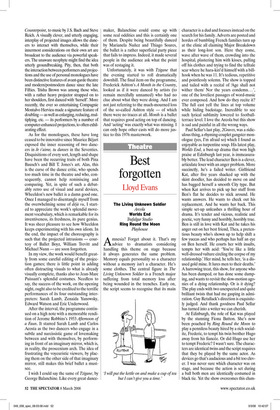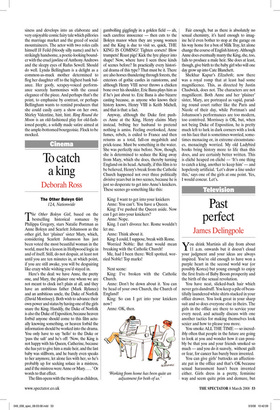Best forgotten
Lloyd Evans
The Living Unknown Soldier Arcola Worlds End Trafalgar Studio Ring Round the Moon Playhouse
Amnesia? Forget about it. That’s my advice to dramatists considering handling this theme on stage because it always generates the same problem. Memory equals personality so a character without a memory isn’t a character. He’s some clothes. The central figure in The Living Unknown Soldier is a French major suffering from total memory loss after being wounded in the trenches. Early on, the script seems to recognise that its main character is a dud and focuses instead on the search for his family. Adverts are posted and hordes of bumbling French families turn up at the clinic all claiming Major Breakdown as their long-lost son. Here they come, wave after wave of them, crowding into the hospital, plastering him with kisses, pulling off his clothes and trying to find the telltale scar where he hara-kiri’d himself with a billhook when he was 11. It’s tedious, repetitive and pointlessly solemn. The show is topped and tailed with a recital of ‘Age shall not wither them/ Nor the years condemn... ’, one of the loveliest passages of word-music ever composed. And how do they recite it? The full cast yell the lines at top volume while hiding backstage. Incredible to see such lyrical sublimity lowered to footballterrace level. I love the Arcola but this show is sad and painful in all the wrong ways.
Paul Sellar’s last play, 2Graves, was a ridiculous thing, a rhyming-couplet gangster monologue (yes, I’m afraid so) which I found as enjoyable as turpentine soup. His latest play, Worlds End, a bust-up drama that won high praise at Edinburgh last year, is immeasurably better. The lead character Ben is a clever, articulate loser with an anger problem. More succinctly, he’s a failed writer. Girlfriend Kat, after five years shacked up with the skint doodler, has decided to move on and has bagged herself a smooth City type. But when Kat arrives to pick up her stuff from Ben’s flat he decides to stick around. He wants answers. He wants to check out his replacement. And he wants her back. This simple set-up unleashes a thrilling hour of drama. It’s tender and vicious, realistic and poetic, very funny and horribly, horribly true. Ben is still in love with Kat and he takes his anger out on her best friend, Thea, a pretentious beauty who’s shown up to help shift a few yuccas and who perhaps has half an eye on Ben herself. He courts her with insults, tempts her with acid: ‘You’re like a little well-dressed vulture circling the corpse of my relationship.’ Her mind, he tells her, ‘is a disused gold mine. It lures men to their deaths.’ A harrowing treat, this show, for anyone who has been dumped, or has done some dumping, and wants to revisit the slow-motion agonies of a dying relationship. Or is it dying? The play ends with two unexpected and quite brilliant twists that had me gasping in admiration. Guy Retallack’s direction is exquisitely judged. And thank goodness Paul Sellar has turned into a writer we can cherish.
At Edinburgh, the role of Kat was played by the stunning Fiona Button. She’s now been poached by Ring Round the Moon to play a penniless beauty hired by a rich socialite, Frederic, to tempt his twin brother Hugo away from his fiancée. Or did Hugo use her to tempt Frederic? I wasn’t sure. The characters are identical twins and the script requires that they be played by the same actor. As devices go that’s audacious and a bit too clever. I was never sure which character was on stage, and because the action is set during a ball both men are identically costumed in black tie. Yet the show overcomes this clum siness and develops into an elaborate and very enjoyable comic fairy tale which pillories the marriage market and the greed of social mountaineers. The actor with two roles calls himself JJ Feild (bloody silly name) and he’s strikingly handsome, a poetic-looking bounder with the cruel jawline of Anthony Andrews and the sleepy eyes of Rufus Sewell. Should do well. Lynda Bellingham is a delight as a common-as-muck mother determined to flog her daughter off to the highest bank balance. Her goofy, scrapey-voiced performance scarcely harmonises with the casual elegance of the piece. And perhaps that’s the point, to emphasise by contrast, or perhaps Bellingham wants to remind producers that she could easily carry a show on her own. Shirley Valentine, hint, hint. Ring Round the Moon is an old-fashioned play for old-fashioned people, a solidly made satire aimed at the ample-bottomed bourgeoisie. Flock to be mocked.



















































































 Previous page
Previous page